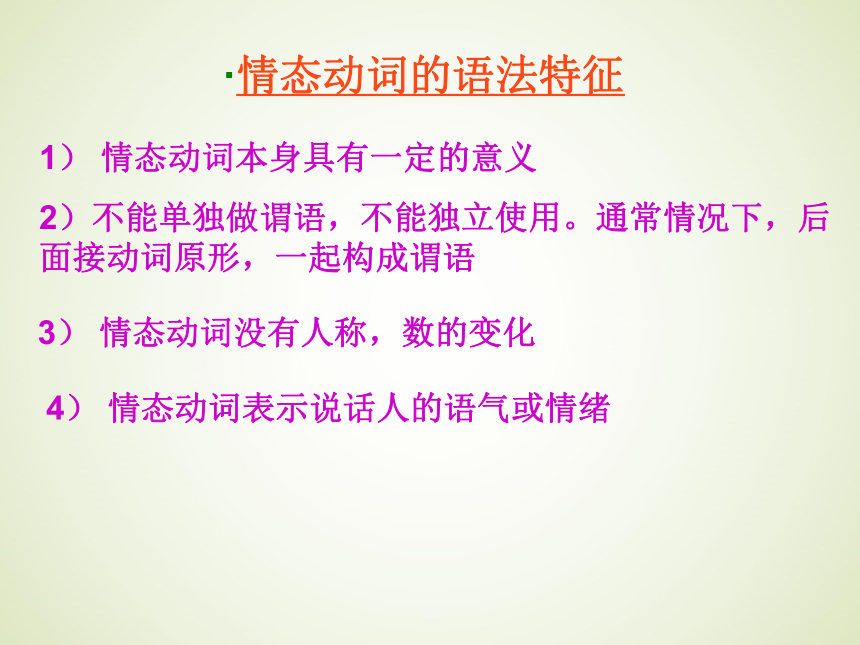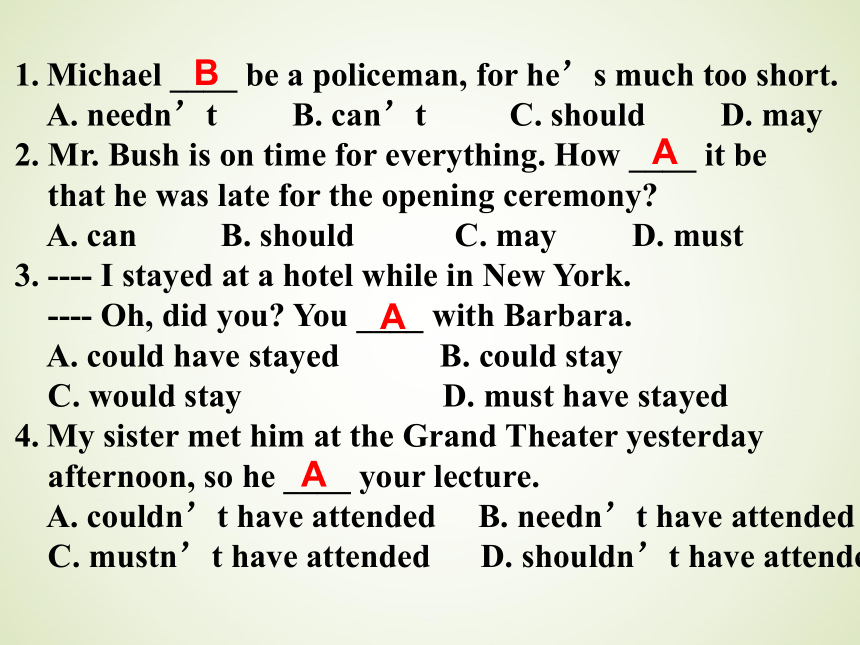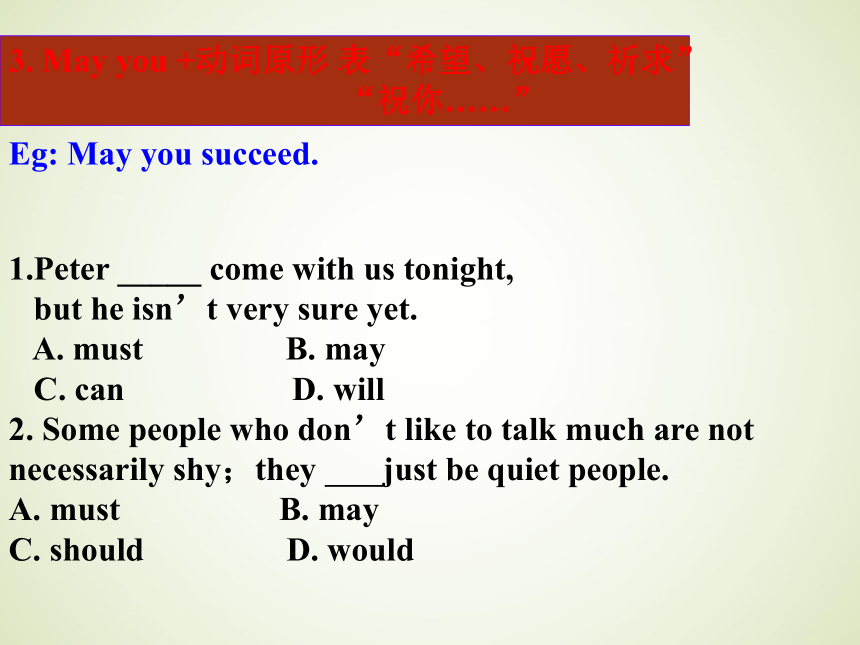人教版高中英语必修三课件:Unit 1 Festivals around the world Period 3(24张PPT)
文档属性
| 名称 | 人教版高中英语必修三课件:Unit 1 Festivals around the world Period 3(24张PPT) |  | |
| 格式 | zip | ||
| 文件大小 | 708.5KB | ||
| 资源类型 | 教案 | ||
| 版本资源 | 人教版(新课程标准) | ||
| 科目 | 英语 | ||
| 更新时间 | 2019-01-12 20:04:33 | ||
图片预览









文档简介
课件24张PPT。GrammarModal verbs 情态动词Unit1 Festivals around the world主要情态动词Can, could
May, might
Must/have to
Need
Dare
Will/would
Shall/should/ought to What modal verbs have you learned?·情态动词的语法特征1)?情态动词本身具有一定的意义
2)不能单独做谓语,不能独立使用。通常情况下,后面接动词原形,一起构成谓语3)?情态动词没有人称,数的变化4)?情态动词表示说话人的语气或情绪1) Some of us can use the computer now,
but we couldn’t last year.
2) The new-built theatre can seat 1500 people.
3) Can she be in the computer center?
4) I think what he said can not be true.
5) Can/Could I use your dictionary?
6) Could you lend me a hand?1.表能力3. 表示“请求” “允许”(表请求时,口语中常用
could 代替 can 使语气更委婉,回答时用can)2. 表示推测,意为“可能”“或许”,用于疑问句或否定句1. can 与could4. 表示“许可”,可与may 换用。You can go home now.5. can 用于疑问句或否定句中时,表惊异、
不相信等,意思是“可能、能够”。How can you say that you really understand the whole
story if you have covered only part of the article?6. can’t/ couldn’t +have + done 表示对过去
情况的否定推测Susan can’t have written a report like this. could + have + done 表示对过去能做而
未做的事情感到惋惜,遗憾;常译为本可以It’s a pity. Your class could have got the first prize.Michael ____ be a policeman, for he’s much too short.
A. needn’t B. can’t C. should D. may
2. Mr. Bush is on time for everything. How ____ it be
that he was late for the opening ceremony?
A. can B. should C. may D. must
3. ---- I stayed at a hotel while in New York.
---- Oh, did you? You ____ with Barbara.
A. could have stayed B. could stay
C. would stay D. must have stayed
My sister met him at the Grand Theater yesterday
afternoon, so he ____ your lecture.
A. couldn’t have attended B. needn’t have attended
C. mustn’t have attended D. shouldn’t have attendedBAAA2. may 与might1. 表示“许可”或“请求”,有“可以”的意思,口语中
常用 might 代 may ,表示委婉语气。
否定回答时用“must not/can not”表“禁止,阻止”,
不用 “may not”. Eg:--- May I watch TV after supper?
--- Yes, you may. / No, you mustn’t.
2. 表示可能性。 意为“或许,可能” might 比 may
可能性小。Eg: 1) It might be true.
2) They may not be in the library now.3. May you +动词原形 表“希望、祝愿、祈求”
“祝你……”Eg: May you succeed.1.Peter _____ come with us tonight,
but he isn’t very sure yet.
A. must B. may
C. can D. will
2. Some people who don’t like to talk much are not necessarily shy;they just be quiet people.
A. must B. may
C. should D. would
3. will 与would 1. 表“请求、建议”等,用 would 比用will 委婉,客气些Eg: 1)Will you lend me your book?
2) Would you like a cup of tea?2. 用于表示意志或意愿。 will 指现在,
而 would 指 过去。Eg: 1) I’ll never do that again.
2) They said that they would help us.
3) No matter what I said, he won’t listen to me.3.表示习惯性动作。 译作 “总是、惯于” will 指现在,
would 指过去。Eg: 1)He will often read all night.
2) Fish will die without water.
3) Every evening, she would sit by window,
deep in thought.4. 表示功能,译作“能、行”Eg: 1) That will be all right.
2) This door won’t open.1.The way the guests ___ in the hotel influenced their evaluation of the service
treated B. were treated
C. would treat D. would be treated What a pity. Considering his ability and experience, he ____ better.
A. need have done B. must have done
C. can have done D. might have done Liza ___ well not want to go on the trip --- she hates traveling.
A. will B. can C. must D. mayAlthough this ____ sound like a simple task, great care is needed.
A. must B. may C. shall D. should DDBD4. Should ought to语气更强 否定为 ought not to
Everybody ought to do at least two things.
1. 用于表劝告、建议。 意为”应该、应当”。Eg: You should keep your promise.2. 用于表推测。 意为 “可能、该…”Eg: 1) It’s 7 o’clock, he should be at home.
2) They should have arrived by now.3. 用于第一人称,表示说话人的谦逊、客气的语气I should advise you not to do that.1. —I don’t care what people think.
—Well, you _______
A. could B. would C. should D. might2. What do you mean, there are only ten tickets? There_____ be twelve.
A. should B. would
C. will D. shallCA5.must, have tomust 必须:主动 have to不得不:被动接受
1. 表示义务、意图或建议:必须,应该
I must leave at six today.
我今天必须六点钟离开。
2. 表示推测:必定,一定
The light is still on, so he must be at home. 灯还是亮的,他一定在家
3. 表示主张:硬要,一定要
If you must go, at least wait till the rain stops.
如果你坚持要走,至少也要等雨停了再走
6.need“需要” dare“敢” 肯定句:need/dare to do (实意动词)
否定句:needn’t/daren’t do (情态动词)7. shall
1) 在一、三人称的疑问句中, shall用来
询问对方的意愿。如:
Shall we begin our lesson?
When shall he be able to leave the
hospital?
2) 用于二、三人称的陈述句中, 表说话人
命令、警告、允诺等口吻。如:
He shall have the book when I finish
reading.
You shall do as I say.情态动词+have+done一、 “must+have+done”表示对过去事情的肯定推测,译成“一定做过某事”,该结构只用于肯定句。
1. It must have rained last night, for the ground is wet.
2. You must have been mad to speak to the servant.
二、 “can't/couldn’t+have+done”表示对过去事情的否定推测,译成“不可能做过某事”。
1. Mr. Smith can't have gone to Beijing, for I saw him in the library just now.
2. Mary can't have stolen your money. She has gone home.
三、“could+have+done”是虚拟语气,表示对过去事情的假设,意思是本来能够做某事而没有做。
He could have passed the exam, but he was too careless.
四、 “may/might+have+done”表示对发生过的事情的推测,意思是“可能已经”或“也许已经”,用于肯定句中。
1.—What has happened to George?—I don't know. He may have got lost.
2. She might have achieved greater progress, if you had given her more chances. 五、 “would+have+done”虚拟语气,表示对过去事情的假设,意思是“本来会做”。
1. I would have told you all about the boy's story, but you didn't ask me.
2. Without your help, I wouldn't have achieved so much.
六、 “should+have+done”意思是 本来应该做某事,实际没做。
“shouldn't+have+done”表示本来不应该做某事,而实际做了。指责对方或自责的含意。
1. Tom, you are too lazy. The work should have been finished yesterday.
2. Look, Tom is crying. I shouldn't have been so harsh on him.
七、 “ought to+have+done”表示过去应该做而实际并没有做,译成“理应做……”,往往表示遗憾。与“should+have+done”用法基本一样。
1.I ought to have gone home last Sunday.
2.You ought not to have given him more help. Complete the following sentences using modal verbs.You’ve been working all day. You ______ be very tired.
2. I wonder who that is. It _____ be Lisa. She’s in the library at this time.
3. It is a long time since we met last time. You _____ come and see us more often.
4. I haven’t decided where I’m going for my holidays. I _____ go to Australia.mustcan’tshouldmay
5. --- Who was the man talking with your
teacher?
--- I’m not sure. It ______ be her brother.
6. I don’t know when the guests be here. They
_________ arrive at any time.mightwill / could As he had heart attack, he was told that he
____ continue the work. A. needn't B. may not C. mustn't D. can't
2. I ____ like to make a suggestion.
A. could B. would C. must D. might
3. I know things are hard with you, but you ____ try to get over the difficulties. A. can B. may C. must D. oughtC C B Choose the best answers.4. We hope that as many people as possible
_____ join us for the picnic tomorrow. ???? A. may B. must??? C. should D. can 5. — I think I’ll give Bob a ring. ????—You _____. You haven’t been in touch
with him for ages. ???? A. will B. may ??? C. would D. should DD6. It is usually warm in my hometown in March,
but it _____ be rather cold sometimes.
A. must B. can C. should D. would
7. You don’t have to know the name of the
author to find a book. You _____ find the
book by the title.
A. must B. need C. can D. would
8. Although this ____ sound like a simple task, great care is needed.
A. must B. may C. shall D. shouldB C B 9. You ______ be hungry already — you had
lunch only two hours ago!
A. wouldn’t B. can’t
C. mustn’t D. needn’t
10. According to the air traffic rules, you ___
switch off your mobile phone before
boarding.
A. may B. can C. would D. should
11. She ______ have left school, for her bike is
still here.
A. can’t B. wouldn’t
C. shouldn’t D. mustn’tB D A
May, might
Must/have to
Need
Dare
Will/would
Shall/should/ought to What modal verbs have you learned?·情态动词的语法特征1)?情态动词本身具有一定的意义
2)不能单独做谓语,不能独立使用。通常情况下,后面接动词原形,一起构成谓语3)?情态动词没有人称,数的变化4)?情态动词表示说话人的语气或情绪1) Some of us can use the computer now,
but we couldn’t last year.
2) The new-built theatre can seat 1500 people.
3) Can she be in the computer center?
4) I think what he said can not be true.
5) Can/Could I use your dictionary?
6) Could you lend me a hand?1.表能力3. 表示“请求” “允许”(表请求时,口语中常用
could 代替 can 使语气更委婉,回答时用can)2. 表示推测,意为“可能”“或许”,用于疑问句或否定句1. can 与could4. 表示“许可”,可与may 换用。You can go home now.5. can 用于疑问句或否定句中时,表惊异、
不相信等,意思是“可能、能够”。How can you say that you really understand the whole
story if you have covered only part of the article?6. can’t/ couldn’t +have + done 表示对过去
情况的否定推测Susan can’t have written a report like this. could + have + done 表示对过去能做而
未做的事情感到惋惜,遗憾;常译为本可以It’s a pity. Your class could have got the first prize.Michael ____ be a policeman, for he’s much too short.
A. needn’t B. can’t C. should D. may
2. Mr. Bush is on time for everything. How ____ it be
that he was late for the opening ceremony?
A. can B. should C. may D. must
3. ---- I stayed at a hotel while in New York.
---- Oh, did you? You ____ with Barbara.
A. could have stayed B. could stay
C. would stay D. must have stayed
My sister met him at the Grand Theater yesterday
afternoon, so he ____ your lecture.
A. couldn’t have attended B. needn’t have attended
C. mustn’t have attended D. shouldn’t have attendedBAAA2. may 与might1. 表示“许可”或“请求”,有“可以”的意思,口语中
常用 might 代 may ,表示委婉语气。
否定回答时用“must not/can not”表“禁止,阻止”,
不用 “may not”. Eg:--- May I watch TV after supper?
--- Yes, you may. / No, you mustn’t.
2. 表示可能性。 意为“或许,可能” might 比 may
可能性小。Eg: 1) It might be true.
2) They may not be in the library now.3. May you +动词原形 表“希望、祝愿、祈求”
“祝你……”Eg: May you succeed.1.Peter _____ come with us tonight,
but he isn’t very sure yet.
A. must B. may
C. can D. will
2. Some people who don’t like to talk much are not necessarily shy;they just be quiet people.
A. must B. may
C. should D. would
3. will 与would 1. 表“请求、建议”等,用 would 比用will 委婉,客气些Eg: 1)Will you lend me your book?
2) Would you like a cup of tea?2. 用于表示意志或意愿。 will 指现在,
而 would 指 过去。Eg: 1) I’ll never do that again.
2) They said that they would help us.
3) No matter what I said, he won’t listen to me.3.表示习惯性动作。 译作 “总是、惯于” will 指现在,
would 指过去。Eg: 1)He will often read all night.
2) Fish will die without water.
3) Every evening, she would sit by window,
deep in thought.4. 表示功能,译作“能、行”Eg: 1) That will be all right.
2) This door won’t open.1.The way the guests ___ in the hotel influenced their evaluation of the service
treated B. were treated
C. would treat D. would be treated What a pity. Considering his ability and experience, he ____ better.
A. need have done B. must have done
C. can have done D. might have done Liza ___ well not want to go on the trip --- she hates traveling.
A. will B. can C. must D. mayAlthough this ____ sound like a simple task, great care is needed.
A. must B. may C. shall D. should DDBD4. Should ought to语气更强 否定为 ought not to
Everybody ought to do at least two things.
1. 用于表劝告、建议。 意为”应该、应当”。Eg: You should keep your promise.2. 用于表推测。 意为 “可能、该…”Eg: 1) It’s 7 o’clock, he should be at home.
2) They should have arrived by now.3. 用于第一人称,表示说话人的谦逊、客气的语气I should advise you not to do that.1. —I don’t care what people think.
—Well, you _______
A. could B. would C. should D. might2. What do you mean, there are only ten tickets? There_____ be twelve.
A. should B. would
C. will D. shallCA5.must, have tomust 必须:主动 have to不得不:被动接受
1. 表示义务、意图或建议:必须,应该
I must leave at six today.
我今天必须六点钟离开。
2. 表示推测:必定,一定
The light is still on, so he must be at home. 灯还是亮的,他一定在家
3. 表示主张:硬要,一定要
If you must go, at least wait till the rain stops.
如果你坚持要走,至少也要等雨停了再走
6.need“需要” dare“敢” 肯定句:need/dare to do (实意动词)
否定句:needn’t/daren’t do (情态动词)7. shall
1) 在一、三人称的疑问句中, shall用来
询问对方的意愿。如:
Shall we begin our lesson?
When shall he be able to leave the
hospital?
2) 用于二、三人称的陈述句中, 表说话人
命令、警告、允诺等口吻。如:
He shall have the book when I finish
reading.
You shall do as I say.情态动词+have+done一、 “must+have+done”表示对过去事情的肯定推测,译成“一定做过某事”,该结构只用于肯定句。
1. It must have rained last night, for the ground is wet.
2. You must have been mad to speak to the servant.
二、 “can't/couldn’t+have+done”表示对过去事情的否定推测,译成“不可能做过某事”。
1. Mr. Smith can't have gone to Beijing, for I saw him in the library just now.
2. Mary can't have stolen your money. She has gone home.
三、“could+have+done”是虚拟语气,表示对过去事情的假设,意思是本来能够做某事而没有做。
He could have passed the exam, but he was too careless.
四、 “may/might+have+done”表示对发生过的事情的推测,意思是“可能已经”或“也许已经”,用于肯定句中。
1.—What has happened to George?—I don't know. He may have got lost.
2. She might have achieved greater progress, if you had given her more chances. 五、 “would+have+done”虚拟语气,表示对过去事情的假设,意思是“本来会做”。
1. I would have told you all about the boy's story, but you didn't ask me.
2. Without your help, I wouldn't have achieved so much.
六、 “should+have+done”意思是 本来应该做某事,实际没做。
“shouldn't+have+done”表示本来不应该做某事,而实际做了。指责对方或自责的含意。
1. Tom, you are too lazy. The work should have been finished yesterday.
2. Look, Tom is crying. I shouldn't have been so harsh on him.
七、 “ought to+have+done”表示过去应该做而实际并没有做,译成“理应做……”,往往表示遗憾。与“should+have+done”用法基本一样。
1.I ought to have gone home last Sunday.
2.You ought not to have given him more help. Complete the following sentences using modal verbs.You’ve been working all day. You ______ be very tired.
2. I wonder who that is. It _____ be Lisa. She’s in the library at this time.
3. It is a long time since we met last time. You _____ come and see us more often.
4. I haven’t decided where I’m going for my holidays. I _____ go to Australia.mustcan’tshouldmay
5. --- Who was the man talking with your
teacher?
--- I’m not sure. It ______ be her brother.
6. I don’t know when the guests be here. They
_________ arrive at any time.mightwill / could As he had heart attack, he was told that he
____ continue the work. A. needn't B. may not C. mustn't D. can't
2. I ____ like to make a suggestion.
A. could B. would C. must D. might
3. I know things are hard with you, but you ____ try to get over the difficulties. A. can B. may C. must D. oughtC C B Choose the best answers.4. We hope that as many people as possible
_____ join us for the picnic tomorrow. ???? A. may B. must??? C. should D. can 5. — I think I’ll give Bob a ring. ????—You _____. You haven’t been in touch
with him for ages. ???? A. will B. may ??? C. would D. should DD6. It is usually warm in my hometown in March,
but it _____ be rather cold sometimes.
A. must B. can C. should D. would
7. You don’t have to know the name of the
author to find a book. You _____ find the
book by the title.
A. must B. need C. can D. would
8. Although this ____ sound like a simple task, great care is needed.
A. must B. may C. shall D. shouldB C B 9. You ______ be hungry already — you had
lunch only two hours ago!
A. wouldn’t B. can’t
C. mustn’t D. needn’t
10. According to the air traffic rules, you ___
switch off your mobile phone before
boarding.
A. may B. can C. would D. should
11. She ______ have left school, for her bike is
still here.
A. can’t B. wouldn’t
C. shouldn’t D. mustn’tB D A
同课章节目录
